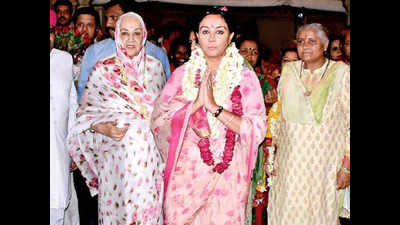- News
- City News
- jaipur News
- Lok Sabha polls: How RSS swung Rajasthan for saffron party
Trending
This story is from May 25, 2019
Lok Sabha polls: How RSS swung Rajasthan for saffron party
An increase of nearly 20% in vote share from the last assembly elections, held just six months ago, is what swung the fortunes of the saffron party in the state Lok Sabha polls.

Member of erstwhile royal family Padmini Devi with Rajsamand MP Diya Kumari at City Palace on Friday
JAIPUR: An increase of nearly 20% in vote share from the last assembly elections, held just six months ago, is what swung the fortunes of the saffron party in the state Lok Sabha polls.
Without doubt, the popularity of Prime Minister Narendra Modi helped BJP cover major ground in the state, which it had lost in the December 2018 assembly polls. The BJP had then clocked a vote share of 38.8%, which was only .5% less than Congress’ 39.3%.
But BJP’s vote share shot up to 58.5% in the LS polls while that of Congress fell from 39.3% to 34.2%.The only relief for the Congress party is that it has recorded a 1.6% increase in vote share compared to 2014 LS polls. On the other hand, the BJP has recorded an improvement of 4% compared to 54.5% which it recorded in 2014.
The recent verdict re-established the fact that the electorate is supreme in a democracy and that it can never be taken for granted. The electorate, which had voted against the ruling BJP in December, ensured a historic win for the party this time. While the December results reflected their rejection of the state leadership, the Lok Sabha results showed their faith in Modi.
“Our own party workers were divided into three groups in December – those who were silent, those who were RSS supporters and those from the CM Vasundhara Raje camp. The only ones to be active were those from the Raje camp while others either stayed away or worked half-heartedly,” said a senior party member.
The support of local Rashtriya Swayamsevak Sangh (RSS) workers in poll booth management and campaigning also helped the state BJP unit. The RSS had proactively participated in campaigning in all 25 constituencies, with special focus on 12 seats, including Barmer, Nagaur, Jodhpur, Jaipur rural and others.
“In Karauli-Dholpur, which is one of the weakest seats for the BJP, a member of the RSS state executive committee, Hemant, was working on the ground with the support of 4,000 workers. The RSS launched its work on mobilising voters in the state in each of the constituencies in December,” said a senior RSS member.
The change in the attitude of workers also helped in persuading voters, who already seemed to be clear of who they wanted in the state and Union governments. The result: BJP, which could only win 73 of the 200 assembly seats in December, recorded a lead in 185 this time.
Without doubt, the popularity of Prime Minister Narendra Modi helped BJP cover major ground in the state, which it had lost in the December 2018 assembly polls. The BJP had then clocked a vote share of 38.8%, which was only .5% less than Congress’ 39.3%.
But BJP’s vote share shot up to 58.5% in the LS polls while that of Congress fell from 39.3% to 34.2%.The only relief for the Congress party is that it has recorded a 1.6% increase in vote share compared to 2014 LS polls. On the other hand, the BJP has recorded an improvement of 4% compared to 54.5% which it recorded in 2014.
The recent verdict re-established the fact that the electorate is supreme in a democracy and that it can never be taken for granted. The electorate, which had voted against the ruling BJP in December, ensured a historic win for the party this time. While the December results reflected their rejection of the state leadership, the Lok Sabha results showed their faith in Modi.
Senior state party leaders admit that the attitude of the party workers and voters in the state towards the saffron party took a 180 degree turn post the assembly elections.
“Our own party workers were divided into three groups in December – those who were silent, those who were RSS supporters and those from the CM Vasundhara Raje camp. The only ones to be active were those from the Raje camp while others either stayed away or worked half-heartedly,” said a senior party member.
The support of local Rashtriya Swayamsevak Sangh (RSS) workers in poll booth management and campaigning also helped the state BJP unit. The RSS had proactively participated in campaigning in all 25 constituencies, with special focus on 12 seats, including Barmer, Nagaur, Jodhpur, Jaipur rural and others.
“In Karauli-Dholpur, which is one of the weakest seats for the BJP, a member of the RSS state executive committee, Hemant, was working on the ground with the support of 4,000 workers. The RSS launched its work on mobilising voters in the state in each of the constituencies in December,” said a senior RSS member.
The change in the attitude of workers also helped in persuading voters, who already seemed to be clear of who they wanted in the state and Union governments. The result: BJP, which could only win 73 of the 200 assembly seats in December, recorded a lead in 185 this time.
End of Article
FOLLOW US ON SOCIAL MEDIA










